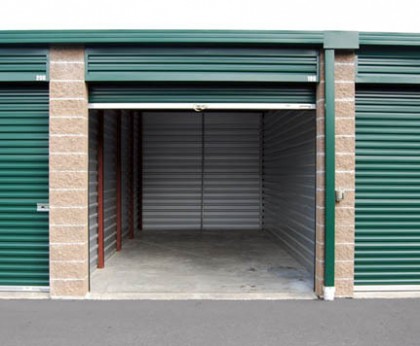Fillable Storage Unit Lease Agreement | PDF | RTF | Word
Sponsored Links
Leasing a storage unit is usually simpler than leasing a residence or commercial space. But there are still important rights and potentially valuable property involved, so it’s important to create a thorough storage unit lease agreement to cover each party’s rights and duties.
Sponsored Links
Using a Storage Unit Lease Agreement

A typical storage unit available for lease
Similar to other types of lease agreement, storage unit lease agreements should always feature certain provisions and sections. These include:
- Contact/personal information of parties
- Location of storage unit and individual unit number(s)
- Payment/fees
- Use of the units
- Owner’s rights to enter unit
- Notice
- Term of lease
- Access
- Liability
- Property left in space
- Termination
- Climate control
The payment section should of course cover the monthly fee, but also specify when a payment is considered late, how much the late fee penalty is, how to make payment, and whether there are any fees for locks or breaking locks if the owner has to enter. Additional fees incurred for non-payment of rent are often called lockout fees.
Use of the Unit
Typically, storage units are meant to store personal property, most often furniture, appliances, instruments, and the like. A lease agreement will usually prohibit renters from storing toxic, explosive, noxious, hazardous, or perishable materials, for obvious reasons. Agreements also prohibit any illegal items or acts to be carried out at the space, in addition to nuisances. In some areas, local bands rent storage spaces to practice playing music in, which may work fine if the owners and local residents don’t complain. Owners may also prevent potential liability by prohibiting renters from storing very valuable items such as jewelry.
There may also be a provision requiring renters to keep the unit clean, and charging them if it is not clean when they remove their property.
Owner’s Right to Enter
Every storage unit contract will have a section stating when owners may enter the unit. Often, this section will require the owner to give 1-2 days’ written notice, unless there is an emergency that requires the owner to enter to protect the owner’s property or comply with law. The section should also specify whether the owner’s agents or anyone else, such as law enforcement or emergency services, may enter under these conditions.
Property
The agreement should state what the owner may do with property left in the unit after the agreement has terminated, and whether the renter is responsible for paying for its removal.
When a renter becomes delinquent on rent after a specified period, such as 30 days, often the contract will state that the owner receives a lien on the renter’s property that the owner may enforce by selling the property at a public sale.
Most contracts will also require you to release the owner from any liability from damage to your property.
Notice
As with renting residences, renters usually have to give 30 days’ notice before moving property out before the lease has expired, and should also notify owners of any changes in contact information.
Sources
Sponsored Links